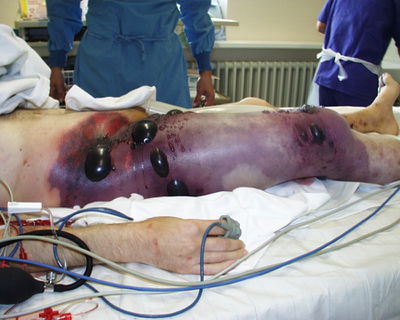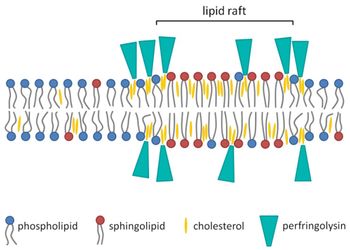The Role of Clostridium perfringens Toxins in Gas Gangrene: Difference between revisions
| Line 24: | Line 24: | ||
All strains of C. perfringens produce the alpha toxin, also called CPA or PLC. The alpha toxin cleaves molecules from the surface the host cell's’ phospholipid bilayers and disrupts the membrane’s functions, which then promotes cell lysis and death. | All strains of C. perfringens produce the alpha toxin, also called CPA or PLC. The alpha toxin cleaves molecules from the surface the host cell's’ phospholipid bilayers and disrupts the membrane’s functions, which then promotes cell lysis and death. | ||
[[Image:Alpha_toxin_on_membrane.jpeg|thumb| | [[Image:Alpha_toxin_on_membrane.jpeg|thumb|350px|right|Alpha toxin attachment and insertion into host cell membrane. Courtesy of <i>The Jounal of Biochemistry</i>, 2004, Vol. 136, Issue 5, 569-574, published on Oxford Journals (http://jb.oxfordjournals.org/content/136/5/569.long.]] | ||
==Perfringolysin O (PFO)== | ==Perfringolysin O (PFO)== | ||
Revision as of 19:59, 25 April 2016
What is Gas Gangrene?
By Marysol Arce

Other examples:
Bold
Italic
Subscript: H2O
Superscript: Fe3+
Introduce the topic of your paper. What is your research question? What experiments have addressed your question? Applications for medicine and/or environment?
A citation code consists of a hyperlinked reference within "ref" begin and end codes.
[1]
Alpha Toxin (PLC)
Include some current research, with at least one figure showing data.
Every point of information REQUIRES CITATION using the citation tool shown above.
All strains of C. perfringens produce the alpha toxin, also called CPA or PLC. The alpha toxin cleaves molecules from the surface the host cell's’ phospholipid bilayers and disrupts the membrane’s functions, which then promotes cell lysis and death.

Perfringolysin O (PFO)
Include some current research, with at least one figure showing data.

How Do These Toxins Help C. perfringens Persist and Spread in the Body?
Include some current research, with at least one figure showing data.
